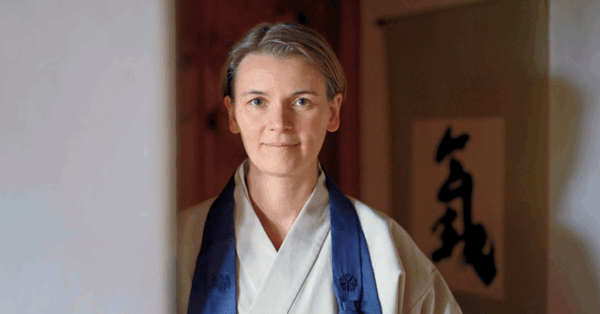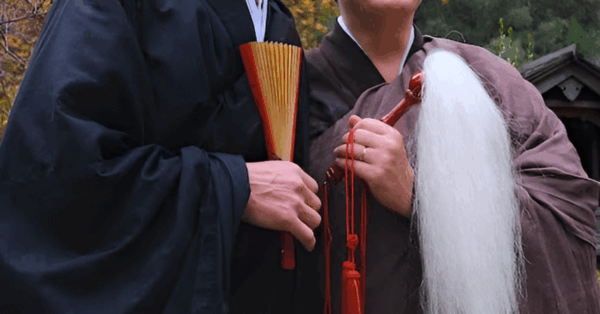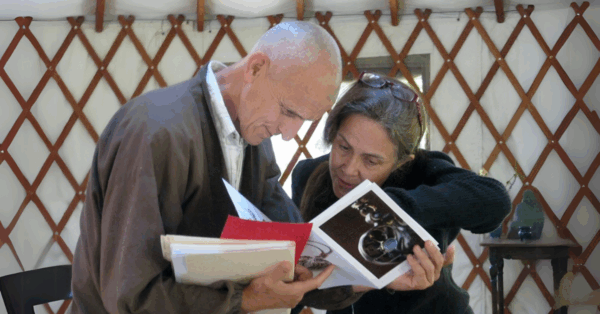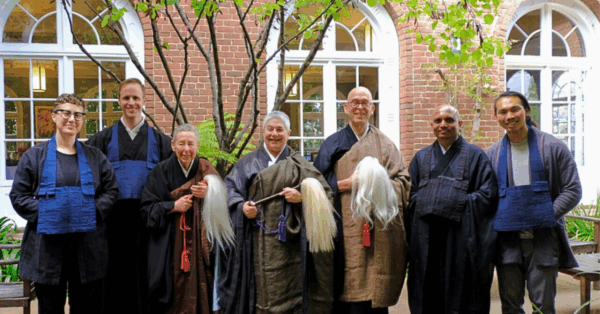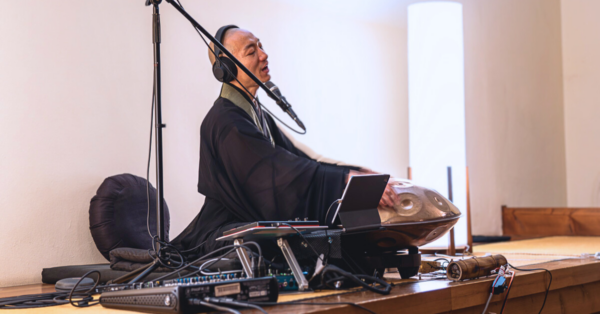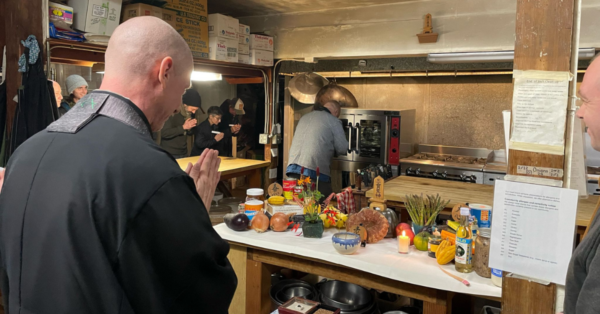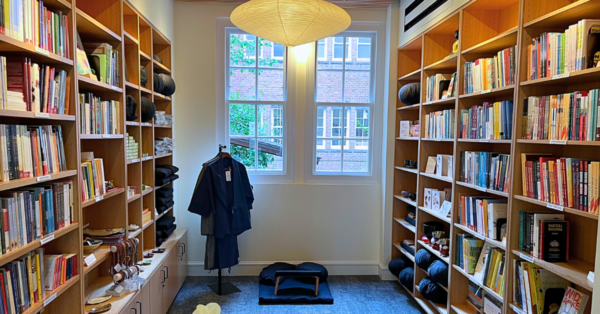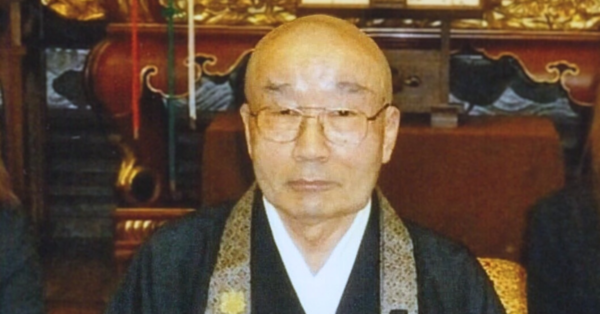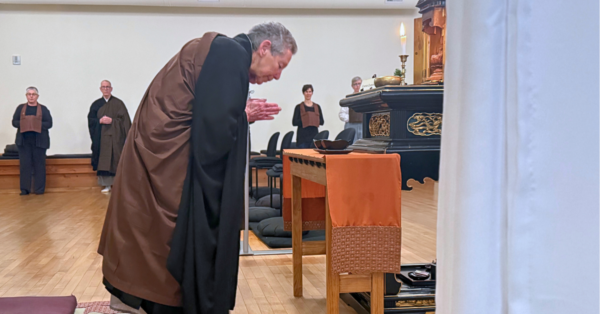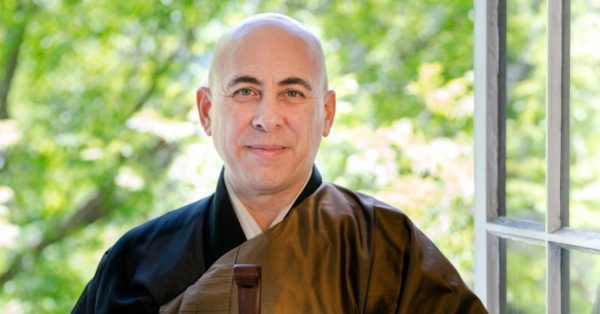
Tenzen David Zimmerman, photo by Tasja Keetman.
By Tova Green
Tenzen David Zimmerman was the Abiding Abbot of San Francisco Zen Center’s Beginner’s Mind Temple for the last four years. He transitioned to the role of Central Abbot on March 11, 2023.
What David enjoyed most about being Abiding Abbot of SFZC’s urban temple was taking care of the day-to-day Zen ceremonial practice and teaching. His days began with a round of the altars at City Center — the kaisando/founder’s hall, the kitchen, the Buddha Hall, and then opening the zendo with a silent jundo, a greeting to those who were meditating. He enjoyed meeting students, supporting them, and nurturing their practice by being an encouraging, reflective presence.
David met with residents individually in person and with members of the wider sangha both in person and on Zoom, including students from Mexico, Australia, Malaysia, and Europe. He led practice periods, gave Dharma talks, and taught classes. He delighted in the process of finding a theme for a practice period, such as Karma which he explored at City Center or the Mountains and Rivers Sutra of Dogen which he explored at Tassajara. “It’s very enjoyable to do the studying. I come from a humanities background and feel it’s important to offer both breadth and depth when sharing the Dharma.”
At City Center, David has many opportunities to engage with sangha members who are householders. “They contribute to the vitality of the practice and the temple, as does the online community.” City Center is especially interesting to David because, of SFZC’s three temples, it is the most porous, the most “in the world.” “We are more immediately exposed to and made aware of the myriad conditions in the world that people are struggling and practicing with, whether through the media, through the concerns people bring with them, or simply by stepping outside our front door.”
David had been in the Abiding Abbot’s seat for only a year when the pandemic began. “I had just settled in and found my footing before the ground was pulled out from under us, our community, and the world. Not only were there practical factors, like safety and financial matters, that needed attention—there was also the emotional impact that such a disruption had on our lives and on our practice.” Through a series of online practice sessions and one-on-one meetings, he supported others to work with fear and grief in addition to the usual day-to-day challenges.
“Now the challenge is to reopen safely, regroup, and revitalize the practice at the temple for both residents and members of the wider community.” During the pandemic some students moved away, while many mahasangha members got used to practicing at home. “How can we convey the value of in-person practice? As an institution, the work we need to continue to do to support a diverse sangha is an ongoing, ever-evolving process, requiring both cultural and structural changes. How can we best do that work?”
As David begins to transition to his new role as Central Abbot, he will be focusing on the well-being and vitality of San Francisco Zen Center as a whole, with less focus on day-to-day practice at City Center. His attention will be directed more to the vision, mission, and administrative direction of SFZC. He will spend less time on ritual and teaching and more time on administrative, educational, and business realms, including curriculum development, fundraising, and supporting Enso Village, Greens Restaurant, and SFZC’s organizational transformation processes. He will also be looking at how to continue to use SFZC’s limited resources in impactful and responsible ways. David is honored to lead the sangha and is committed to the endeavor. He will learn more about what is involved when he takes up his new role.
“Each Abbot has their own interests, priorities, strengths, and skills, and has to respond to the particular challenges that arise during their tenure.” As all three abbots will be new to their roles, David sees a need for them to come together for a sense of collective clarity and alignment around how to manifest SFZC’s mission, values, and approach to Zen training. This will be particularly significant as many of the founding SFZC teachers are retiring. “Conditions have changed, and the next generation needs to be awake and responsive to how things are now rather than how they were over the last six decades.” He, City Center Abiding Abbot Mako Voelkel, and Green Gulch Farm Abiding Abbot Jiryu Rutschman-Byler are three new spiritual and institutional leaders with new visions, who will provide the teachings and Dharma in the spirit of Suzuki Roshi, using approaches that speak to the realities of current times.
David’s path to becoming an abbot was based on “practice, practice, practice. Being at SFZC as a resident for twenty-three years, I was invited to step into roles of ever-increasing responsibility. I depended on Zen practice both as an anchor and as a compass to help me navigate the various challenges I encountered, both internally and externally.” An example of this was being the Tassajara Director in 2008, at the time of the Basin Complex fire (described in the book Fire Monks, Zen Mind Meets Wildfire by Colleen Morton Bush). His ability to face such a challenge increased David’s faith in the practice, which gave him a greater sense of groundedness, confidence, and spaciousness to meet life’s challenges.
David moved to San Francisco in 1988 and was working for the San Francisco AIDS Foundation for his first couple of years in the city. He saw many people die, including close friends. At that time, his father had cancer and was dying. David thought about how to meet death with a greater sense of composure and compassion, as well as how to be more present in his own life as well as for others. He asked a friend, “Where can I learn to meditate?” and his friend recommended SFZC’s City Center. David attended zazen instruction one Saturday morning. “Immediately something resonated for me. I came back regularly for meditation and Dharma talks.”
Like incoming abbot Jiryu Rutschman-Byler, David has a Mennonite heritage, and can trace his family ancestry on his father’s side back to 1732, when his Mennonite ancestors first landed in Pennsylvania, fleeing religious persecution in Switzerland. “Because I’d spent a number of years in a Mennonite children’s home when I was a child (following my parent’s divorce), I saw similarities with City Center — people eating and practicing together, living a life that revolved around faith and service. The children’s home was a large brick building that included a communal kitchen, a parlor where people could meet and gather, and a sewing room. The dedicated and compassionate women who took care of us children in the home were my first models for bodhisattva practice. That experience planted a seed in me … the desire to live a life in service when I grew up.”
What David most appreciates about SFZC is that it offers people a space and a framework to learn about the Dharma, integrate it into their lives, and connect with others who share similar interests and aspirations. “That’s fundamentally what SFZC has to offer the world, and it‘s what we need to continue to focus on as a community and organization. We meet suffering in the world by starting with ourselves, so we can develop a greater sense of agency when meeting suffering, engage the world with wisdom and compassion, and address the harms that contribute to our own suffering as well as the suffering of others. We have to work on both simultaneously. We need to see how greed, hate, and delusion are embedded in our minds as well as in the structures of our society.”
David’s root teacher is Teah Strozer, who gave him the Dharma name Myozan Tenzen — Luminous Mountain, Spontaneously Thus. David also studied with the late Myogen Steve Stücky, who, like David and Jiryu, had a Mennonite background. “Steve was very grounded, down-to-earth, straightforward, warm, and kind.” Then there was Dr. Lee Lipp, with whom David taught and who guided him in leading workshops on “Transforming Depression and Anxiety.” David has also enjoyed working with and co-leading classes with Abbot Ed Sattizahn, who he feels conveys Suzuki Roshi’s way.
“Zen Center is not so much the place, but the people who are here, who come together to practice in myriad ways.” Serving as the Central Abbot “is less about me and more about our endeavoring together. I’m one of many people who love Soto Zen practice and SFZC and want it to thrive and prosper for the benefit of all. I join with many others in that vital work.”


